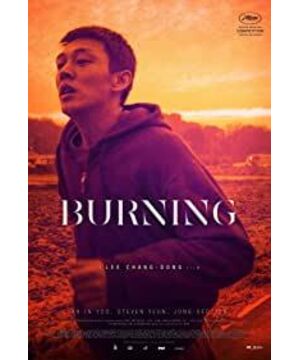It is also directed by a heavyweight director in the Korean film industry, and has been shortlisted for the main competition unit of the Cannes Film Festival. Li Changdong's "Burning" and Feng Junhao's "Parasite" will inevitably be compared with each other.
The two films invariably reveal the current situation of class differentiation in Korea, but on the surface of class issues, Li Changdong is subtle and profound, using metaphors to reveal the nihility and alienation of people in postmodern society; The bizarre story criticizes the class divisions in South Korea and exposes the despair and helplessness of the bottom society.
"Burning" maintains the consistent poetry and precision of Li Cangdong's film language, with a large number of realistic scenes and delicate sound effects, creating an atmosphere where reality and fiction are intertwined.
sound as a metaphor for class
At the beginning of the film, we were taken into a noisy street. This is where the actor Lee Jong-soo works for delivery. People come and go, the traffic is noisy, the whistle, the noise of the engine, the music of the street speakers, the promotion of the roadside stalls. Crying sounds, one after another: These carefully mixed ambient ambient sounds suddenly put the audience in the Korean market. It is obvious that this is the corner of the city where cheap shops gather, surrounded by working-class people who live in poverty.
The heroine, Huimei, is the dancer in the sales promotion of the shops in this area. She recognizes Zhong Xiu, a delivery man, who was her neighbor in the countryside when she was a child.
Huimi took Zhongxiu to her rental house. Huimei's residence is adjacent to Nanshan Mountain, which is also a noisy residential area. The house is small and the sound insulation is poor. You can hear messy traffic, talking, children crying and dog barking at any time. These rich and realistic voices reflect High population density and unsatisfactory living conditions.
Zhong Xiu's home is in the countryside, and the sound of moo-moo cows can be heard from time to time. Interestingly, North Korea's political propaganda broadcasts are uninterrupted day and night, disturbing the people but helpless. Here, the voice broadens the expression of the image. On the one hand, it explains the remoteness of Zhong Xiu's hometown near the border of the country, and on the other hand, it also metaphors the geopolitical dilemma and isolation of the Korean Peninsula.
At night, there are insects chirping and wild geese chirping. At Zhong Xiu's house, modern artificial sounds from TV programs and news stations recklessly fill in the dull and boring natural sounds of the countryside. The reality at the bottom of the countryside is the constant hedging and complex coexistence of modern society and agricultural society.
Young people who drive sports cars live in luxury apartments in wealthy districts. The first time Zhong Xiu came to see Ben at the coffee shop, he said that the residential area here is very quiet. Quietness means that the population density is smaller, that the people who live there are more cultivated and quality, and that the sound insulation performance of the building community. Soothing jazz music is always playing in the place where I live, where I work out, and in casual cafes. Jazz represents style, and style seems to be inseparable from class.
Ben's apartment was also exceptionally quiet, with almost no outside sounds, and the decorative paintings and chamber music also showed taste and wealth. Unlike Zhongxiu and Huimei's residences, except for the terrace, Ben's apartment has too many artificial design traces, and there is little that kind of natural atmosphere. Ben drove to the wild to contemplate the lakes and mountains, perhaps a kind of seeking and making up for nature.
It can be seen that the sound environment design of "Burning" is very good. While creating a spatial texture, it also strengthens the class differences of the characters. The sound is also a metaphor of class.
Soul Shattering Gale, Skeleton Bass
Ben boasted to Zhong Xiu that he had a habit of burning plastic greenhouses. When he burned the greenhouse, he would feel joy, and a bass would sound in his heart, a bass that resonated through the bone marrow. The movie "Burning" is adapted from Haruki Murakami's novel "Burning the Barn". In Haruki Murakami's original work, the burning of the barn to some extent represents the nihilistic tendencies of the younger generation.
Li Cangdong was adapted into burning plastic greenhouses in the movie. For Ben, burning greenhouses is an anti-social behavior. The film seems to use multiple clues to suggest that Ben’s hobby of burning greenhouses is actually a metaphor, referring to playing with women or even The covert act of femicide. According to this interpretation, the essence of the film is to attract and hunt low-level girls on the fringes of society with their own wealth, taste and charm, to please their own nihilistic life, and the girl ends up in the end of the world, like discarded plastic. The greenhouse was burned down by a fire, as if it never existed.
Of course, Li Cangdong carefully created a gap between the text and the image, which opened a gap for the story. The metaphor of burning the greenhouse also has various intriguing interpretation spaces.
The soundtrack of the film uses a lot of bass like cello and bass, and it has the feeling of the deep bass that Ben said. When Zhong Xiu was looking for an abandoned plastic greenhouse on the road in the countryside, when he followed Ben to Wild Lake, when he stabbed Ben to death and burned his body to drive away, the soundtrack sounded, the hooking bass and The strange drum beat creates a strong atmosphere of mystery and suspense.
Huimei talked about the difference between little hunger and great hunger among the Bushmen of African tribes, one is the physiological need, and the other is the desire for the meaning of existence. Emi also performed these two dances in front of Ben's friends, the Little Hunger Dance where the palms face the ground, and the Big Hunger dance where the hands reach the sky. The laughter of the audience and Emi's ecstatic dance rhythms formed an interesting sound tension.
One day, Ben drove Huimei to visit Zhongxiu’s house in the countryside suddenly. The three of them sat in front of the house watching the sunset. With the help of marijuana, Huimei followed the rhythm of the car music and danced emotionally while taking off her shirt.
The music at this time is "Générique", a jazz piece played by the jazz master Miles Davis, known as the "King of Darkness", which was previously used in the French Black Crime directed by Louis Mahler In the movie "The Elevator to the Gallows", the heroine Jeanne Moreau roamed the streets in a chaotic manner, waiting for her lover to return. This tune improvised by Davis was emotional and full of fate and suspense.
Li Cangdong used a long shot to show this nude dance under the twilight afterglow. Emi stretched her arms in the wind, and the slow-moving camera captured the beautiful silhouette. After this low-pitched music ended, we heard the sound of the evening wind again.
And Emi was moved by this scene and couldn't help sobbing and coughing. At the peak of this emotional concentration, the scene was not over yet. The camera panned all the way to the border of South Korea, and then to the treetops, the evening in the countryside, the cowshed. The humming of cattle, the sound of hunting flags flying, the chirping of insects and the flapping wings of birds. The audience followed the camera and fully immersed in the night of the countryside, and the mood also ebbs and calms down during the delay. This sound and picture is so natural, it can be called the most beautiful and moving paragraph in the whole film.
Emotions, Dreams, and Imagination
In Huimei's rental room, Huimei got close to Zhongxiu and kissed him. At this time, the noisy outdoor sound suddenly poured in from the window. This is the externalization of Zhongxiu's psychological disturbance caused by the impact of lust. When the two were having sex, Zhong Xiu was lying on the bed and saw a shimmer of light reflected from the Nanshan Tower falling on the corner of the wall. Distracted by a beam of light, it was all a little too sudden for him. After Huimei's trip to Africa, Zhong Xiu came to her room and masturbated to the shimmering light reflected from the Nanshan Pagoda. It was also accompanied by the noisy roar of cars outside. These chaotic roaring atmospheres set off Zhong Xiu's chaotic lust and confusion. mood.
Huimei took Ben's sports car to leave Zhongxiu's house in the country. Zhongxiu had a dream that night. A little boy was lit by fire, and in front of him was a burning plastic greenhouse. This dream is silent, but it is extremely powerful. There is only a raging flame in the picture, but we seem to hear a huge roaring flame. Zhong Xiu later found Ben and asked him if he knew where Huimei was going. Ben said, "She disappeared like smoke." This strange dream may be a metaphor for Huimei's disappearance or death, and the silence also added to Huimei's disappearance. Unreal colors.
Li Cangdong has always had a high degree of control over text, so he is not satisfied with simple metaphors and suspenseful murder movie routines. In Li Cangdong's script, Zhong Xiu is a down-and-out amateur novelist with a dream of being a writer. At the end of the film, he sits in Emi's room and writes on a laptop. The camera zooms out from the window, and then pans to the right over the city. The sound of traffic, honking, the crowd, and the rich sound environment of the city are all pouring in. .
Zhong Xiu's figure is in the left corner of the painting, and a large city scene is on the right. Apparently this scene seems to imply that some of the plot in the film is just the unfolding of Chung Soo's imagination as he writes it. Since then, the film has blurred the boundary between fiction and reality, so that it is impossible to distinguish whether Zhong Xiu stabbed the book to death with a knife at the end and burned the body to escape whether it really happened or whether it was just Zhong Xiu's imagination.
But it doesn't matter whether it's true or not. This film has been discussing the philosophical proposition of "existence", whether oranges exist, cats exist, fallen wells, Huimei exist... These are thrown out. The problem points to the mental nihilism of postmodern society, which transcends the social classes represented by Zhongxiu, Huimei, and Ben. They are all in their own predicament, repressed and helpless, feeling the emptiness of the meaning of existence.
It can be said that "Burning" attempts to question the ultimate meaning of life in the confrontation between "little hunger" and "big hunger".
View more about Burning reviews










